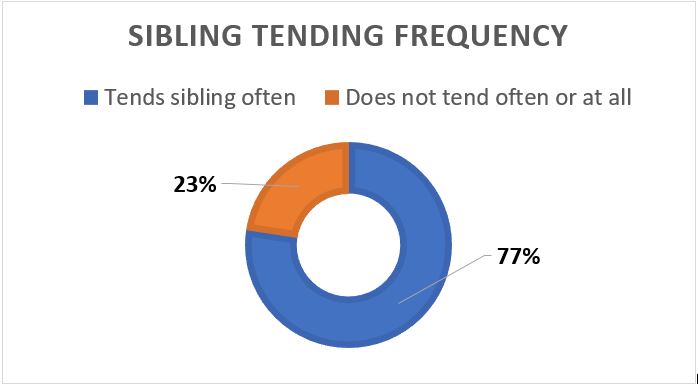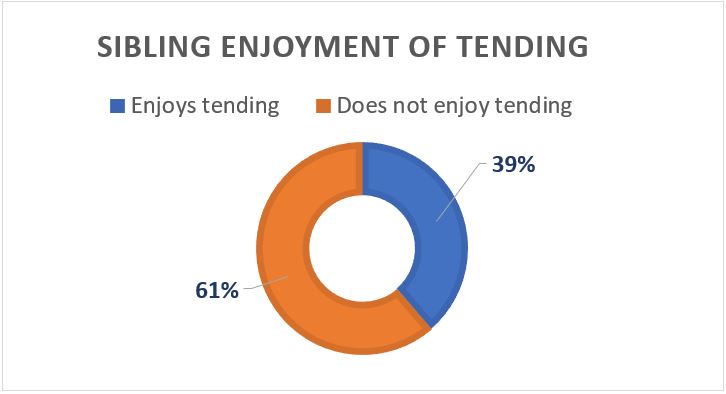Siblings often make excellent caregivers for their sibling with Prader-Willi syndrome (PWS) because they grow up around PWS, understand the realities of the syndrome, and are trained throughout their lives to take care of their sibling. Therefore, siblings seem to be a parent’s perfect choice to tend their family member with PWS and often become a secondary or even primary caregiver. However, parents often do not realize the burden this responsibility is for children who are trying to navigate school, friends, and growing up.
As one mother was trying to find someone to tend her daughter with PWS, she considered each of her extended family members and friends but concluded that nobody could handle the responsibility. In addition, she did not want to burden them with the arduous task. She then became guilt-ridden when she considered how often she expected her young daughters to tend their sister with PWS. In this realization, she glimpsed the burden siblings face. She knew adults could not handle her daughter with PWS but expected it from her young children.
The older the family member with PWS is, the harder tending usually is for siblings. One explanation could be that the member with PWS is larger and tends to have more intense food-seeking behavior, and behavioral problems. In addition, tending can be more difficult when the family member with PWS is older than the sibling tending. One 12-year-old sibling said, “I can’t do stuff because I have to watch my 20-year-old brother,” (Murphy, Thornton & Thornton, 2019). It can be difficult for younger siblings to assert authority over their older sibling with PWS when they can be overpowered by their size and strength. This can leave the younger sibling feeling overwhelmed, unsafe, and powerless.
Many siblings report enjoying watching their sibling with PWS. As a sibling said, “When I tend my sibling, I feel like I am helping my parents. It feels good in a way” (Murphy, Thornton & Thornton, 2019). However, most siblings do not enjoy this responsibility with many viewing it as a burden and getting in the way of their other responsibilities and priorities.
Tips for Improving Sibling Caregiving
• Make sure the sibling knows they are supposed to tend. Some siblings reported waking up with their parents away with the expectation that the sibling will tend (Murphy, Thornton & Thornton, 2019). This causes unnecessary panic and another way the siblings have little control over their environment and life. Maybe make a physical schedule for when your children are supposed to tend.
• Ask your children to tend, do not assign them. Also, allow them to say no sometimes. This will show your children that you respect and value them and give them more control over their environment.
• Talk to your children without PWS often about their experience caregiving and how they feel about it. Make a formal plan with them about how often they tend and what to do if something goes wrong to make their experience better and give them more control. Review the plan often and make changes based on your children’s feedback.
• Debrief after any difficulties siblings have tending (refer to previous article “Tips for Improving the Well-being of Siblings of Individuals with Prader-Willi Syndrome: Debriefing” found at https://www.pwsausa.org/tips-for-improving-the-well-being-of-siblings-of-individuals-with-prader-willi-syndrome-debriefing/).
• Consider having siblings tend their family member with PWS less often. Make sure they have time to relax and unwind away from their sibling with PWS. As a sibling said, “We are dealing with a lot at home with them, so let us have more time away from home, more time with friends. Have less expectations because of the stress of home life” (Murphy, Thornton & Thornton). Consider taking the child with PWS out for an adventure at set times so your other children can feel comfortable bringing friends over to your house.
• Consider your children’s ages. If your children are young, perhaps younger than 12, consider not having them tend, having them tend only for short periods of time, or having them tend with older siblings. Siblings reported tending their family member with PWS by themselves as young as 8-years-old, which can be an enormous burden for someone who is still lacking key developmental abilities (Murphy, Thornton & Thornton, 2019). Many experts consider age 8 to be too young to stay home by themselves let alone tend an individual with complex needs and erratic behavior (Child Welfare Information Gateway, 2018). Before letting your children tend their family member with PWS make sure they are comfortable being alone with the member with PWS and are mature enough to handle and diffuse difficult situations.
Also, if your child with PWS is older than the sibling, be mindful that this can make it harder on the sibling. Take steps to increase the comfort of your child tending such as having them tend less often, for shorter periods of time and continually making sure the child tending feels safe being alone with your child with PWS.
• Try to find others that can watch your child with PWS. Parents need time off and do not have to reduce this time to give your children without PWS a break from tending. Work to obtain available resources for respite care.
Helpful links on funding and respite information:
- https://www.kidswaivers.org/
- https://www.childwelfare.gov/topics/systemwide/service-array/services-to-children-and-youth-with-disabilities/youth/grandparents/
- https://kidshealth.org/en/parents/respite-care.html
References
Murphy, L., Thornton, J., Thornton, E. (2019). Tips for Supporting Parents. Prader-Willi Syndrome Association (USA). Retrieved from: https://ww.pwsausa.org/2019convention handouts/
Leaving Your Child Home Alone. (2018). Child Welfare Information Gateway. Retrieved July 25,2020 from https://www.childwelfare.gov/pubPDFs/homealone.pdf
Contributed by Jane Thornton and Emma Thornton






 Perry A. Zirkel has written more than 1,500 publications on various aspects of school law, with an emphasis on legal issues in special education. He writes a regular column for NAESP’s Principal magazine and NASP’s Communiqué newsletter, and he did so previously for Phi Delta Kappan and Teaching Exceptional Children.
Perry A. Zirkel has written more than 1,500 publications on various aspects of school law, with an emphasis on legal issues in special education. He writes a regular column for NAESP’s Principal magazine and NASP’s Communiqué newsletter, and he did so previously for Phi Delta Kappan and Teaching Exceptional Children. Jennifer Bolander has been serving as a Special Education Specialist for PWSA (USA) since October of 2015. She is a graduate of John Carroll University and lives in Ohio with her husband Brad and daughters Kate (17), and Sophia (13) who was born with PWS.
Jennifer Bolander has been serving as a Special Education Specialist for PWSA (USA) since October of 2015. She is a graduate of John Carroll University and lives in Ohio with her husband Brad and daughters Kate (17), and Sophia (13) who was born with PWS. Dr. Amy McTighe is the PWS Program Manager and Inpatient Teacher at the Center for Prader-Willi Syndrome at the Children’s Institute of Pittsburgh. She graduated from Duquesne University receiving her Bachelor’s and Master’s degree in Education with a focus on elementary education, special education, and language arts.
Dr. Amy McTighe is the PWS Program Manager and Inpatient Teacher at the Center for Prader-Willi Syndrome at the Children’s Institute of Pittsburgh. She graduated from Duquesne University receiving her Bachelor’s and Master’s degree in Education with a focus on elementary education, special education, and language arts. Evan has worked with the Prader-Willi Syndrome Association (USA) since 2007 primarily as a Crisis Intervention and Family Support Counselor. Evans works with parents and schools to foster strong collaborative relationships and appropriate educational environments for students with PWS.
Evan has worked with the Prader-Willi Syndrome Association (USA) since 2007 primarily as a Crisis Intervention and Family Support Counselor. Evans works with parents and schools to foster strong collaborative relationships and appropriate educational environments for students with PWS. Staci Zimmerman works for Prader-Willi Syndrome Association of Colorado as an Individualized Education Program (IEP) consultant. Staci collaborates with the PWS multi-disciplinary clinic at the Children’s Hospital in Denver supporting families and school districts around the United States with their child’s Individual Educational Plan.
Staci Zimmerman works for Prader-Willi Syndrome Association of Colorado as an Individualized Education Program (IEP) consultant. Staci collaborates with the PWS multi-disciplinary clinic at the Children’s Hospital in Denver supporting families and school districts around the United States with their child’s Individual Educational Plan. Founded in 2001, SDLC is a non-profit legal services organization dedicated to protecting and advancing the legal rights of people with disabilities throughout the South. It partners with the Southern Poverty Law Center, Protection and Advocacy (P&A) programs, Legal Services Corporations (LSC) and disability organizations on major, systemic disability rights issues involving the Individuals with Disabilities Education Act (IDEA), Americans with Disabilities Act (ADA), and the federal Medicaid Act. Recently in November 2014, Jim retired.
Founded in 2001, SDLC is a non-profit legal services organization dedicated to protecting and advancing the legal rights of people with disabilities throughout the South. It partners with the Southern Poverty Law Center, Protection and Advocacy (P&A) programs, Legal Services Corporations (LSC) and disability organizations on major, systemic disability rights issues involving the Individuals with Disabilities Education Act (IDEA), Americans with Disabilities Act (ADA), and the federal Medicaid Act. Recently in November 2014, Jim retired.